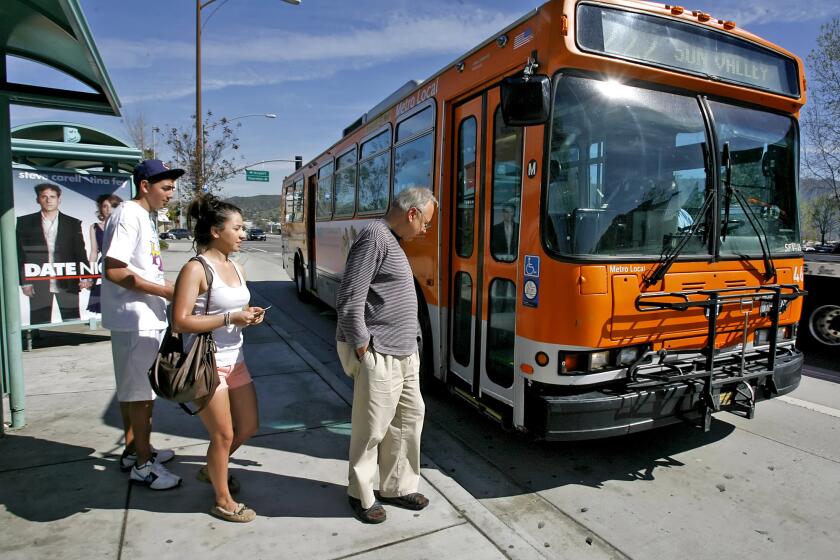Greyhound Once Again Taking a Hard Line
The management of Greyhound Corp. apparently believes that its workers were so badly beaten in their bitter, sometimes violent seven-week strike less than two years ago that they will not put up a fight against the company’s demand for a contract extension that not only will freeze wages for another three years but could also mean the loss of thousands of jobs.
And the company may be right. Its hard-line approach toward its employees and their unions has reportedly reduced morale even below the level that it had reached just after the 1983 strike.
During that strike, which the union waged to keep its old contract terms intact, management began to restore service by hiring strikebreakers and union members willing to cross their own picket lines.
The union’s loss of that strike forced members of the Amalgamated Transit Union to accept management’s demands that included wage and fringe benefit cuts of more than 15% and the creation of a two-tier wage system that pays workers hired after the strike substantially less than those already on the payroll.
Greyhound officials refused to comment on their new proposal to extend into 1989 the present contract, which is not due to expire until next year. Top union officers also refused to discuss the latest company effort to force the workers to accept new contract concessions, such as the right of the company to franchise--and, most critically, freezing wages at their current level until 1989.
But some local-level union officers are so bitter about the proposed extension that they denounced it, saying that it could, among other things, eliminate nearly half of the 10,000 jobs now held by drivers and ticket agents in the union.
Despite opposition from some of the union locals, including Local 1222 in Los Angeles, union officers reluctantly agreed to reopen the current contract for possible changes. Management said that, if the union refused to reopen it to “negotiate” changes, the company would unilaterally abandon a significant number of bus routes and stations, which would mean substantial layoffs of union members.
That threat was harsh enough to persuade a majority of the union’s business agents to “negotiate” the company’s plans for reducing labor costs, according to James Cushing-murray, president of Local 1222.
But, while no agreement was reached, Cushing-murray said the company still will mail terms of a proposed new contract early next month for a membership vote. While he and officers of some other locals oppose it, the union itself is not officially recommending rejection or acceptance of it. The mail ballots will be counted in early December, he said.
Now, the contract has been reopened, and management is threatening that, if members turn down its contract-extension terms, it will go ahead with the plan for drastic cuts in routes and stations--a maneuver that it used to pressure the union’s top officers to agree to reopen the contract.
Domenic Sirigano, head of the union’s nationwide Greyhound council, insisted that he would not comment on the company’s latest maneuver “until after our members have given their own view of the proposal.”
But Cushing-murray said the proposal is “another attempt by John Teets (chairman of Phoenix-based Greyhound Corp., the bus company’s parent firm) to break our union and force our members to make more and more concessions so the company can make more and more profits.”
He also argued that, if the members do accept the contract “on the theory that the company will then not make the cuts in routes and stations, it will be a mistake, because the company will do that anyway.”
The new proposal, according to Local 1222 Vice President Richard Simpson, would allow the company to franchise charter bus trips, which means that jobs could go to employees of non-union companies instead of Greyhound workers.
The company agreed to put some limits on outside franchising. But local union officials are not happy with this. “We see the proposed contract extension as a license to franchise, not a franchise limitation,” Simpson said.
While the company will institute a profit-sharing plan, Simpson contends that it won’t amount to much. “The workers will not get anything until after the owners get a 15% return on their investment, and even then, the workers’ share of the remaining profits, if any, will be reduced by other tricky clauses in the contract,” he said.
Also, Cushing-murray said, another “deceptive provision” is one that would “guarantee” no layoffs of workers with more than 10 years of service to the company. But nearly half of the union members have less than 10 years of service, and even those who would get the guarantee can be required to move long distances to undesirable locations to keep their jobs, he said.
The company’s recent actions are not only more bad economic news for its workers, but they could damage the union, which is now badly divided over how to react to Greyhound’s latest hard-line management style.
The Same Pattern
Gov. George Deukmejian’s ironic appointment last week of a management attorney to head an agency created to protect workers from management abuses follows a pattern set nationally by President Reagan. Both Reagan and Deukmejian are intensifying the opposition of organized labor to their administrations by making appointments that infuriate union leaders, weaken legal protections for workers and bring cheers of approval from management.
Reagan has engendered this antagonism in a variety of ways, but especially by his appointment of National Labor Relations Board members who generally back employers in cases before the NLRB.
Deukmejian has kept labor’s ire at a near-boiling point with many of his appointments, and he did it again last week by naming Lloyd Aubry Jr., 35, as state labor commissioner.
Aubry’s job as head of the Division of Labor Standards Enforcement will be to enforce the state labor laws governing minimum wages, hours and working standards when they are violated by management. The appointment of Aubry to the $66,780-a-year job requires state Senate confirmation.
Aubry, a Republican, has most recently been working for Reagan in the Labor Department as a special assistant to the assistant secretary of labor. But for nearly five years, he was a labor lawyer for management in the San Francisco-based law firm of Littler, Mendelson, Fastiff & Tichy.
The firm has a national reputation for its hard-line assistance to corporations in their fights with unions. The AFL-CIO has labeled the company one of the nation’s top “union-busting” law firms.
Unions’ reaction to Aubry’s appointment was predictable, but, coming as it did a few days after the governor vetoed relatively small increases in workers’ compensation and unemployment benefits, union leaders were unusually harsh.
“God help the working people of California if, as we believe, Mr. Aubry still represents the philosophy of the viciously anti-union law firm of Littler, Mendelson,” said John F. Henning, head of the California AFL-CIO.
“It is as big a mistake as it would be to appoint a socialist as head of the U.S. Chamber of Commerce.”
Aubry, reached by phone at a seminar for management on labor issues, responded mildly to such attacks, saying only: “I disagree with the criticisms.”
While Aubry’s supporters say he will fairly enforce the law that is designed to help workers, his previous role as a management attorney will certainly make his new task a difficult one.






